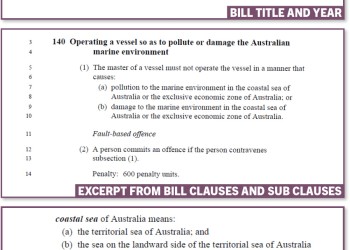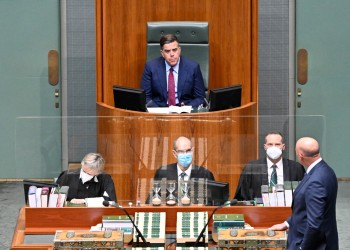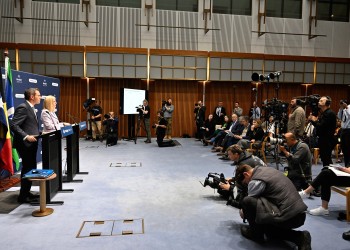Search
Format
Level
Tag
Detail
-
The role of the media
The media provides information and stories about the Australian Parliament. But how much do you know about their role? Take this quick quiz to find out.
-
Social Media Acceptable Use Guidelines
The Parliamentary Education Office (PEO) educates Australians about, and inspires their enthusiasm for, Australia’s parliamentary democracy. The PEO is politically neutral, independent of any political parties/politicians and the work of the Government of Australia. If you would like to engage in a discussion about politics, you could contact local councillors, your state Members of Parliament, or your Federal Members of Parliament (depending on the issue).
We encourage an open dialogue on our… -
Run an election campaign
Experience a modern social media election campaign in your classroom with this classroom activity.
-
Press gallery
Understand the role of the press gallery and its relationship with members of parliament and the public with this fact sheet.
-
Run Question Time
Discover how members of Parliament use Question Time to closely examine the work of the government in this classroom activity. Use this activity to further your study of civics and citizenship.
-
Year 9
After completing this Unit of work and associated assessment tasks, students will have met the achievement standard for the Year 9 Australian Civics and Citizenship Curriculum.
-
Self-paced online learning
Want to deliver informative and engaging parliamentary civics and citizenship education to students from Years 3 to 10? Learn online at your own pace with these civics and citizenship teaching modules.
-
Make speeches
Discover the different types of speeches senators and members make in Parliament by turning your class into a Parliament and doing it yourselves! Use these activities to further explore the work of the Parliament or to give context to oral presentations in any classroom.
-
Negotiate a minority government
Role-play a high stakes parliamentary negotiation in order to learn how government is formed in Australia.
-
Make a law: House of Representatives
Discover how bills – proposed laws – are introduced, debated and voted on in the House of Representatives by turning your class into a Parliament and doing it yourselves!
-
Make a law: Senate
Discover how bills – proposed laws – are introduced, debated and voted on in the Senate by turning your class into a Parliament and doing it yourselves!
-
Senate estimates
Several times a year senators investigate how the government is spending taxpayers' money in meetings called Senate estimates. This fact sheet examines the purpose, function and timing of Senate estimates.
-
Extension activity
Present a petition to the Australian Parliament.
-
Get involved
Explore ways you can get involved in the work of Parliament with this in-depth video. Find out how you can get informed about the work of the Parliament, contact and vote for members of parliament, petition the Parliament and participate in parliamentary inquiries.
-
Images and copyright/privacy/disclaimer
We encourage you to reuse content on the PEO website. Find out the copyright requirements of the site, and read our privacy statement and website disclaimer.
-
Rule of law
The rule of law is a key feature of Australia’s democracy and legal system. This fact sheet explains the principle of the rule of law and its relationship to the separation of powers.
-
Create political parties
Investigate how the party system operates in Australia, and how government is formed in Parliament with this classroom activity. Explore the concepts of parliamentary majority, hung parliament, minority government and the balance of power in the Senate.
-
Create your own electorate
Consider how communities around our country are represented in the Australian Parliament.
-
Year 9
The PEO has a range of resources which assist teachers in their delivery of the Year 9 Australian Civics and Citizenship Curriculum.
-
Question Time in the Australian Parliament
In Question Time members of parliament ask the government to explain its actions and decisions. This video explores the purpose, function and format of Question Time in the Senate and House of Representatives.
-
Year 5
After completing this Unit of work and associated assessment task, students will have met the achievement standard for the Year 5 Australian Civics and Citizenship Curriculum.
-
Year 8
After completing this Unit of work and associated assessment tasks, students will have met the achievement standard for the Year 8 Australian Civics and Citizenship Curriculum.
-
Year 6
The PEO has a range of resources which assist teachers in their delivery of the Year 6 Australian Civics and Citizenship Curriculum.
-
Glossary
Use this helpful glossary to browse or search the meanings of key parliamentary terms.
-
Role-play the Parliament: Committee
This video demonstrates a committee role-play, where students can learn how the Australian Parliament investigates bills and issues. It outlines lesson content and what preparation is required to use this immersive learning strategy in a classroom.
-
Australia's Parliament House
This in-depth look at Australia's Parliament House investigates why Canberra was chosen to be the nation's capital and why we needed a 'new' Parliament House. It includes the design, site and symbolism of the building.


